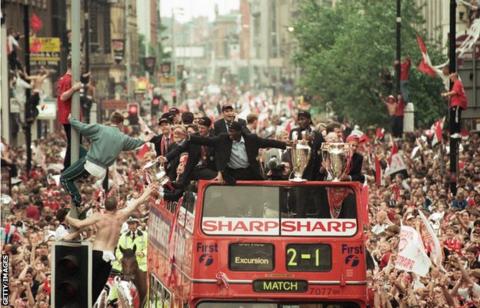Man Utd 1999 Treble: Near misses, determination & 'pure luck'
On 26 May, it will be 20 years since Manchester United completed a remarkable Treble - becoming the only team to win the Premier League, FA Cup and Champions League in one season.
The club are marking the achievement by hosting a Champions League final rematch against Bayern Munich at Old Trafford, and will also be paying tribute on next season's kit.
Yet, such are the fine margins between success and failure that United's Treble hopes were almost killed off before the players seriously started to think it was possible.
Six weeks before finally completing their hat-trick of titles - Premier League, FA Cup and European Cup - Sir Alex Ferguson's side were playing major rivals Arsenal in an FA Cup semi-final replay at Villa Park.
Reduced to 10 men following the dismissal of captain Roy Keane, they were locked at 1-1 when Arsenal were awarded a penalty in the second minute of injury time.
Dennis Bergkamp prepared to take it. Up to that point in his Gunners career, the Dutchman had taken six penalties - and scored every one.
"When it was given, I honestly thought there were still about 10 minutes left," says United keeper Peter Schmeichel. "That's how the game had been. Two teams battling it out, just equal, nothing between them. In the end, at the highest, highest level, it is one stroke of luck that separates you."
Facing that penalty, Schmeichel had nothing to help him but his instincts and his agility. Contrast that with Ben Foster's situation 10 years later when United beat Tottenham on penalties to win the League Cup. On that Wembley day in 2009, United keeper Foster was shown footage on an iPod of where Spurs' players liked to put their spot-kicks.
Back in 1999 at Villa Park, Schmeichel was on his own. He went low to his left. The guess was correct.
"I had done no research," admits the Dane. "The save was pure luck. I'm glad we didn't have iPods in those days. Who knows what would have happened if there had been?"
Schmeichel's save was quickly upstaged as Ryan Giggs scored what has been voted the greatest FA Cup goal of all time to send United through. Physically, the players were exhausted. Mentally, Giggs felt a ripple going through the team. Others noticed it too.
"Within the club, that match was the turning point," says Dave Fevre, the United physio in 1999.
"Two months before, Dwight Yorke was saying '25 more wins to the Treble'. It was a laugh really. But the hurdle of getting over Arsenal with 10 men was a big one. We came in afterwards and felt 'this could happen now'. That is when the belief really kicked in."
After that 14 April extra-time win, United still had 10 games to play if they were going to make history. They could not afford to lose a single one, but went behind in four. Of those, they came back to win three, drawing the other, at Leeds.
Before that Leeds game came a trip to Turin for a Champions League semi-final second leg that has gone down as the finest game of Keane's career.
So consumed was the Irishman in the battle to overturn Juventus' early two-goal lead, the full consequences of his yellow card for a poor tackle on Zinedine Zidane did not entirely hit home until long after the final whistle.
Keane would miss the final, but there were no Paul Gascoigne-style tears,just a steely determination to complete the comeback. He began it himself, scoring with a near-post header. Further goals from Yorke and Andy Cole sent United through 4-3 on aggregate. Next would be Bayern in Barcelona,
"I saw Roy in a different light to a lot of people because we had worked so closely together the previous year when he did his cruciate," says Fevre.
"He was a brilliant injured player. He had such inner strength. Anything I told him to do, he did. Tears are not his style. He knew he'd done his best to get the team there."

Comments
Post a Comment